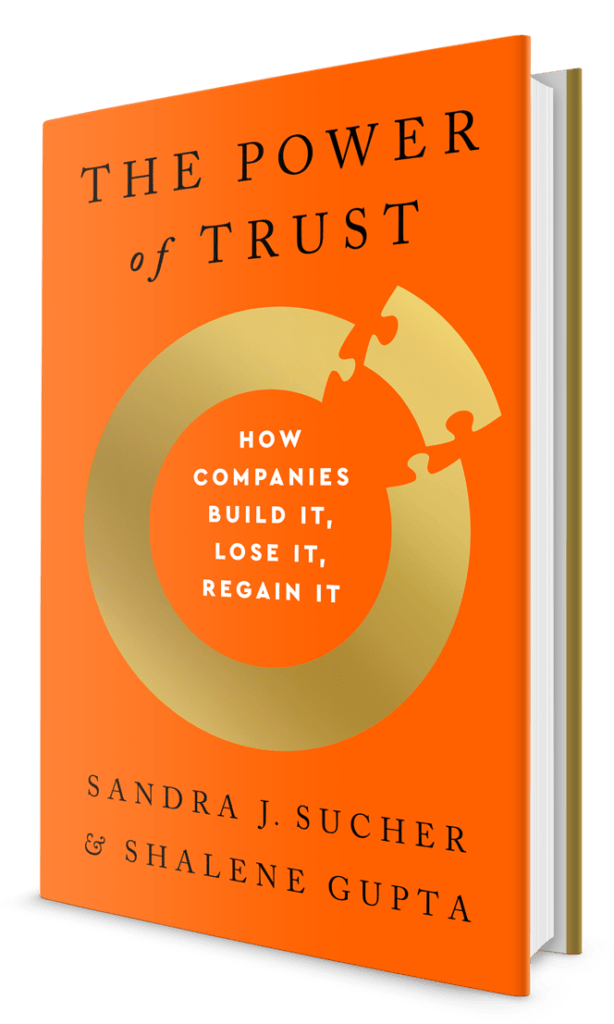Trust isn’t a feeling. It results from intentional choices, says Harvard Business School Professor of Management Practice Sandra J. Sucher.
By helping leaders see trust not as an aesthetic wrapper, but rather as the foundation for building relationships with stakeholders of all kinds – customers, employees, investors, and the public – Sucher provides a roadmap for becoming trusted in a world where the demands on organizations, their leaders, and their boards are growing all the time. Much of her work involves helping key decision makers understand, prioritize and manage the interests of different groups in areas like corporate citizenship and diversity, equity and inclusion (DEI).
Sucher is an accomplished business executive who spent years developing and building on her commitment to moral leadership while working as a manager in the financial services, retail and nonprofit sectors.
As a business process improvement specialist, she actively incorporated trust, morality and DEI into workplace systems and witnessed firsthand how such a focus significantly benefited the organization and its employees. Her new book, “The Power of Trust: How Companies Earn It, Lose It, Regain It,” (Public Affairs, July 2021) – co-authored with colleague Shalene Gupta – summarizes her two decades of research examining the gray areas of business. The book serves as an essential guide for leaders interested in cultivating trust within and outside their organizations.
“Trust underpins a range of issues related to gender, corporate responsibility, race and beyond,” says Sucher, who is a member of the Edelman Trust Institute advisory board and has collaborated with Deloitte on TrustIQ™, a proprietary tool that measures key elements of trust in major corporations and public sector organizations.
“We often think of trust in an ephemeral way, as a good feeling that everyone shares. But trust is actually a skill grounded in relationship management and understanding motivations,” says Sucher. “It’s a framework designed to change cultures and open the door to more effective ways of engaging with constituents.”
Ethics are at the core of Sucher’s work. As an advisor, speaker and executive coach, she teaches leaders the importance of inviting in diverse perspectives before making decisions and shows them how to do it successfully.
She also helps organizations weather disruption without harming employees. Her 2019 articles on trust, “The Trust Crisis,” “Leading with Trust,” and “The Elements of a Good Company Apology” were featured as a “big idea” on HBR.org and her 2018 article, “Layoffs That Don’t Break Your Company,” was selected as a Harvard Business Review “must read” for its insights into how layoffs decimate trust.
“Most of us treat our own moral views as both obvious and self-evident, but leaders must be able to handle complexity by holding multiple perspectives in view at the same time,” says Sucher. “Firms should be looking for reliable methods for leaders to develop and refine these moral reasoning skills.”
Be sure to join “The Power of Trust” authors Sandra Sucher and Shalene Gupta for a virtual fireside chat this Thursday, July 22, hosted by Nasdaq Entrepreneurial Center.
PRAISE FOR “THE POWER OF TRUST”
“Unveils a new understanding of the business, economic, and societal importance of trust.” — Jeffery Weirens, Global Financial Advisory Leader, Deloitte
“You can’t buy it. You can’t sell it. You can’t even see it. But if you had more of it, your employees would work harder, and your customers would stay with you longer. Trust is one of the most valuable intangible assets that a company can have and this book will show you how to get more of it. Packed with wonderful stories and practical examples, this book is a great read. TRUST me!” — Erin Meyer, INSEAD, author of “The Culture Map” and coauthor of “No Rules Rules”
“The 2021 Edelman Trust Barometer found business is the most trusted institution. Business has a new mandate to lead as the world combats ongoing crises and widespread mistrust. Against this backdrop, “The Power of Trust” is a must-read. Both scholarly and practical, it draws on fields from ancient philosophy to modern management theory to analyze and deeply examine the core elements of business trust while taking a lively journey through real-world cases of trust won and lost (and won again). Professor Sandra Sucher and Shalene Gupta make a vital contribution to the conversation and provide a compelling call to action for CEOs to build trust by embracing a broader societal role.” — Richard Edelman, CEO, Edelman
“Full of fresh insights brought to life by compelling examples, “The Power of Trust” is a rich and rewarding read. It’s also extremely timely. With more and more companies today pledging to balance the interests of all of their stakeholders, and not always put their shareholders first, Sandra Sucher and Shalene Gupta make clear that the driving question executives should be asking themselves every time they make a major decision is, ‘Will this enhance trust among those we claim to serve—or betray it?’” — Rick Wartzman, author of “The End of Loyalty”
“With vibrant and compelling insights, Sandra Sucher and Shalene Gupta break important new ground about trust as a key foundation for both human relationships and business. Their illuminating and exciting exploration of what it takes to build it, combined with vivid storytelling, make this page-turner a critical companion for any business leader.” — Hubert Joly, former chairman and CEO, Best Buy, and author of “The Heart of Business”
“Sandra Sucher and Shalene Gupta offer a comprehensive blueprint for companies and leaders who want to build or regain the trust of their stakeholders. Their work provides an insightful trust model that underpins moral leadership — looking at competence, motives, means, and impact. A brilliant resource for anyone who wants to truly understand what trust is, how it works, and what they can do to incorporate it into their leadership practice.” — Celia Moore, co-director, Centre for Responsible Leadership, Imperial College Business School




